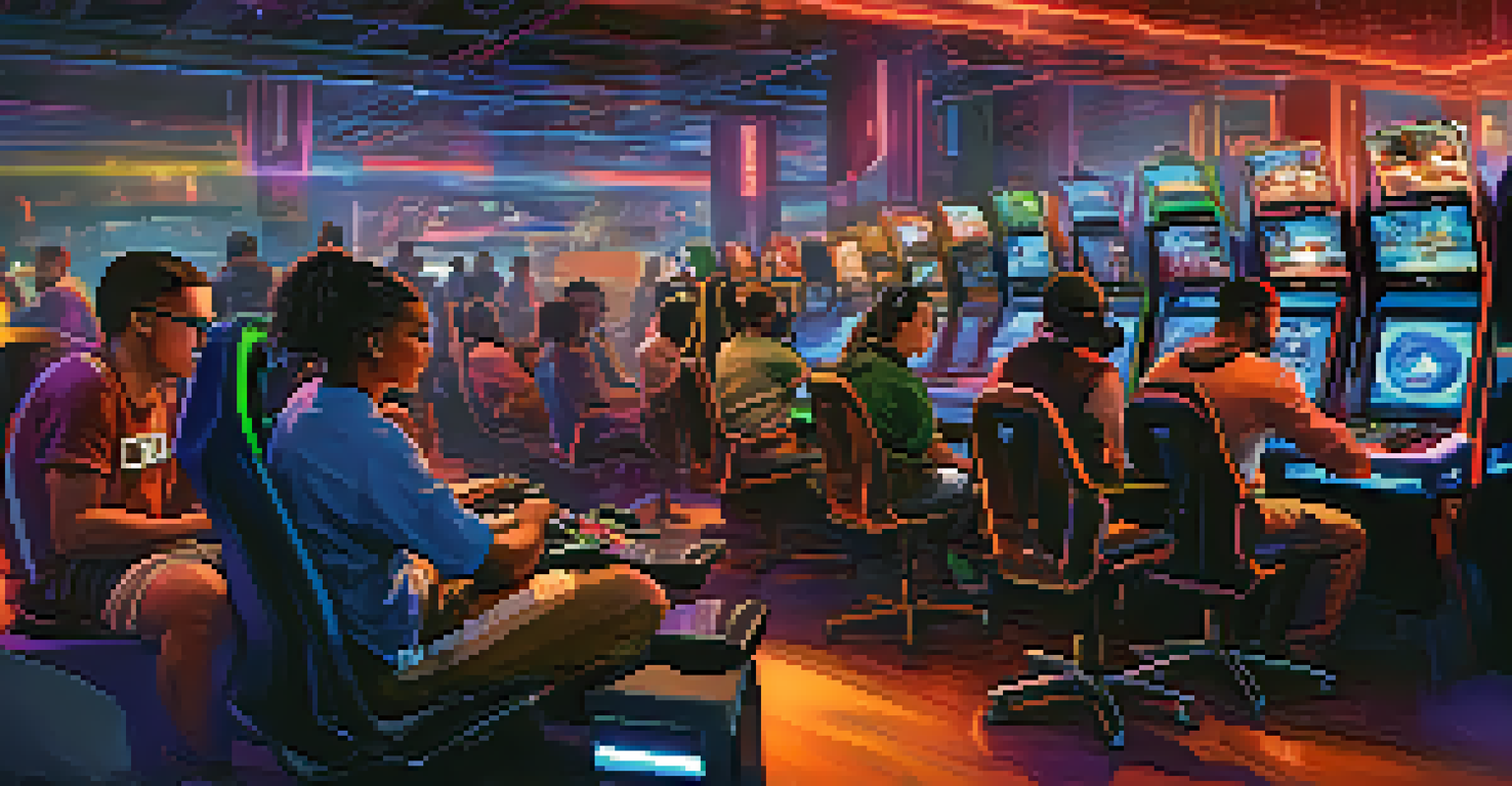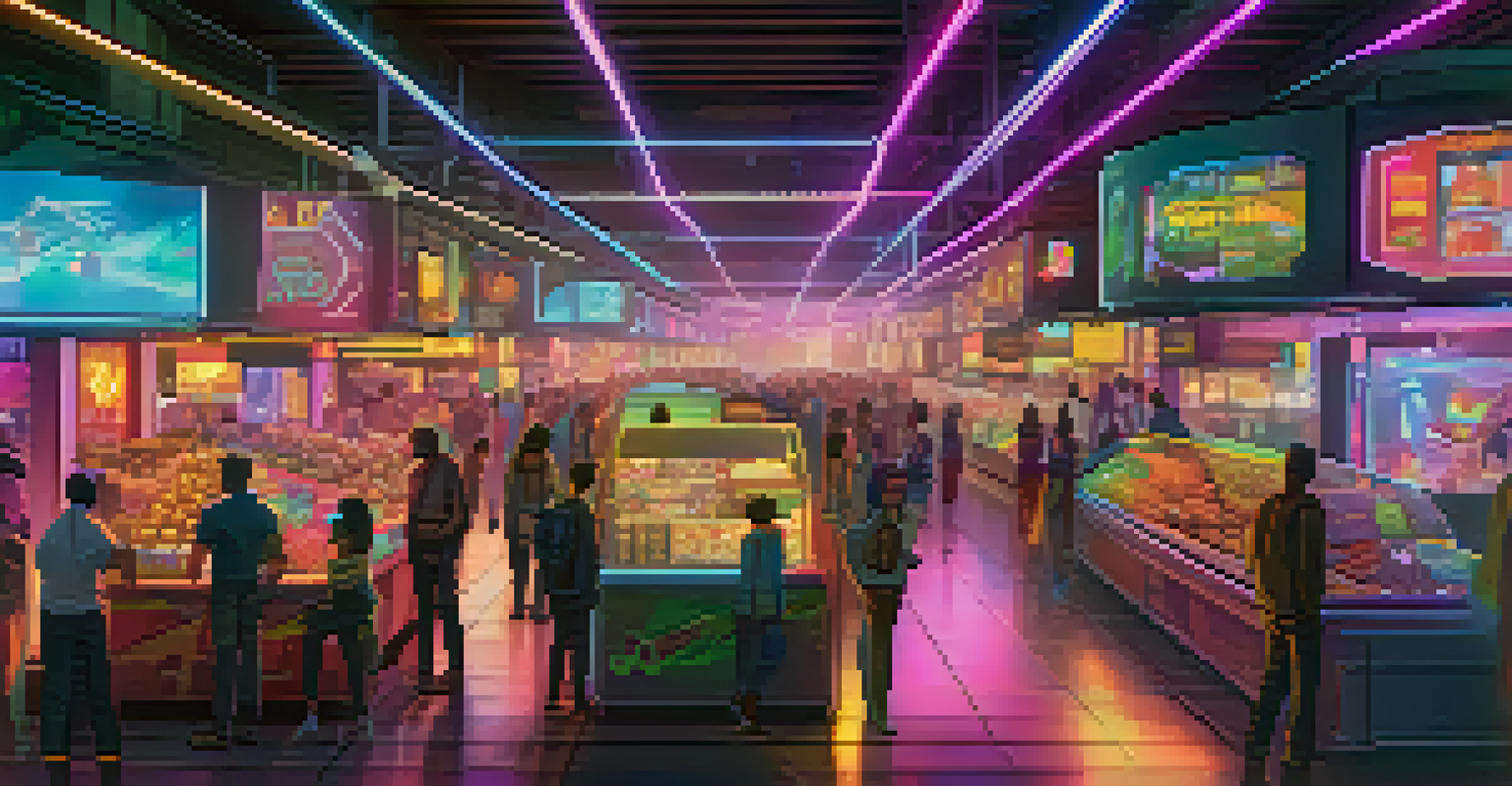Ethereum and Play-to-Earn: Revolutionizing Game Economics

Understanding Ethereum and Its Role in Gaming
Ethereum is a decentralized blockchain platform that enables smart contracts and decentralized applications. This technology allows developers to create complex digital economies within games, setting the stage for innovations like Play-to-Earn (P2E). Essentially, players can earn real value through their in-game actions, transforming the traditional gaming experience.
The future of gaming lies in the hands of players, who are now able to earn real value from their skills and time spent in virtual worlds.
With Ethereum, game developers can create unique assets, known as non-fungible tokens (NFTs), that players can buy, sell, or trade. These assets can represent anything from characters to in-game items, giving players true ownership over their virtual possessions. This shift from centralized control to player ownership is a game-changer in the industry.
Furthermore, the Ethereum network is home to a vibrant ecosystem of developers and gamers, fostering creativity and collaboration. As more games adopt this technology, the potential for innovative gameplay and monetization strategies continues to expand, promising an exciting future for gaming.
What Is Play-to-Earn and How Does It Work?
Play-to-Earn (P2E) is a dynamic model that allows players to earn cryptocurrency or NFTs by playing games. Unlike traditional gaming, where players invest time and money without tangible returns, P2E rewards players for their engagement and skill. This model creates a direct link between gameplay and real-world value.

The mechanics of P2E typically involve completing tasks, winning battles, or participating in the game’s economy. For instance, players can earn tokens that can be traded or sold on various platforms, creating a genuine incentive to play. This not only enhances player engagement but also encourages a thriving community around the game.
Ethereum Transforms Gaming Ownership
Ethereum enables players to truly own in-game assets through non-fungible tokens (NFTs), shifting control from developers to gamers.
Moreover, the P2E model democratizes access to gaming, allowing players from different economic backgrounds to benefit. In regions where traditional job opportunities may be limited, P2E can serve as a viable income source, making gaming more than just a pastime—it becomes a pathway to financial empowerment.
The Economic Impact of Ethereum’s P2E Model
Ethereum's P2E model is not just changing how players interact with games; it's also reshaping the broader gaming economy. By allowing players to earn real income, it creates new market dynamics where in-game assets have actual monetary value. This shift can lead to more sustainable game development as players are directly invested in the success of the game.
Blockchain technology is not just transforming how we play games; it's revolutionizing the entire gaming economy.
As the demand for P2E games grows, so does the potential for new job opportunities within the gaming industry. From game developers to digital artists, the ecosystem fosters a range of careers that didn't exist before. This transformation highlights how blockchain technology can drive economic growth and innovation.
Additionally, the rise of P2E games may influence traditional gaming companies to adapt their business models. As players increasingly seek games that offer real-world benefits, established companies may need to rethink their strategies to stay competitive in this evolving landscape.
Challenges Facing the Play-to-Earn Ecosystem
While the potential of P2E is vast, it is not without its challenges. Issues such as scalability and transaction fees on the Ethereum network can hinder player experience. High gas fees, for instance, can make it costly for players to trade or sell their assets, limiting their ability to fully engage with the game’s economy.
Moreover, the volatility of cryptocurrencies can pose a risk for players. The value of in-game assets can fluctuate dramatically, impacting a player's ability to earn consistently. This unpredictability can be discouraging, especially for those relying on P2E as a significant income source.
Play-to-Earn Empowers Players
The Play-to-Earn model allows players to earn real value through gameplay, linking their engagement directly to economic rewards.
Finally, the regulatory landscape surrounding cryptocurrencies and gaming remains uncertain. As governments worldwide grapple with how to classify and regulate digital assets, the future of P2E may depend on how these regulations evolve. Developers and players alike must stay informed and adaptable in this rapidly changing environment.
The Role of NFTs in Play-to-Earn Games
Non-fungible tokens (NFTs) play a pivotal role in the Play-to-Earn model, providing players with unique, verifiable ownership of in-game assets. Unlike traditional in-game items that are controlled by the game developer, NFTs are stored on the blockchain, allowing players to trade, sell, or use them across different games. This introduces a new level of freedom and creativity for players.
For example, a player might acquire a rare sword in one game, which they can then sell or use in another game that supports cross-game assets. This interoperability enhances the gaming experience and creates opportunities for players to monetize their time and effort across multiple platforms. As a result, NFTs add a layer of excitement and value to the gaming world.
However, the rise of NFTs also brings challenges, such as environmental concerns related to blockchain technology. The energy consumption of certain blockchains has sparked debate about their sustainability. Developers are increasingly seeking solutions to minimize the ecological impact while maintaining the benefits of NFTs in gaming.
Case Studies: Successful Play-to-Earn Games
Several games have successfully implemented the Play-to-Earn model, showcasing its potential. One notable example is Axie Infinity, a game where players breed, raise, and battle creatures called Axies. Players earn tokens through gameplay, which can be traded for real-world currency, creating a thriving economy within the game. Axie Infinity has become a benchmark for P2E games, attracting millions of players globally.
Another successful case is Decentraland, a virtual world where players can buy, sell, and build on parcels of land using NFTs. This game allows players to create their experiences and monetize their creativity, further emphasizing the economic power of P2E. The ability to own and develop virtual real estate has attracted not only gamers but also investors looking to capitalize on the growing metaverse.
Future of Gaming is Collaborative
As more developers embrace the P2E model, a vibrant ecosystem emerges, fostering creativity and innovation in the gaming industry.
These examples illustrate how P2E games can create vibrant ecosystems where players are both participants and stakeholders. As more games adopt this model, we can expect to see even more innovative approaches to gameplay and player engagement, solidifying P2E’s place in the future of gaming.
The Future of Ethereum and Play-to-Earn Gaming
Looking ahead, the future of Ethereum and Play-to-Earn gaming appears bright and full of potential. As blockchain technology continues to evolve, we can expect advancements that will enhance user experience, such as improved scalability and reduced transaction fees. These innovations will make P2E gaming more accessible and enjoyable for players.
Moreover, as more developers recognize the benefits of the P2E model, we can anticipate a surge in new games entering the market. This influx will not only diversify the gaming landscape but also foster competition, leading to better quality games and more engaging gameplay experiences. The creativity and innovation in this space are boundless.

Ultimately, the combination of Ethereum's blockchain capabilities and the P2E model is redefining the relationship between players and games. As players gain more agency and ownership, the gaming industry is likely to see a profound transformation, paving the way for a new era of interactive entertainment that values player investment and creativity.